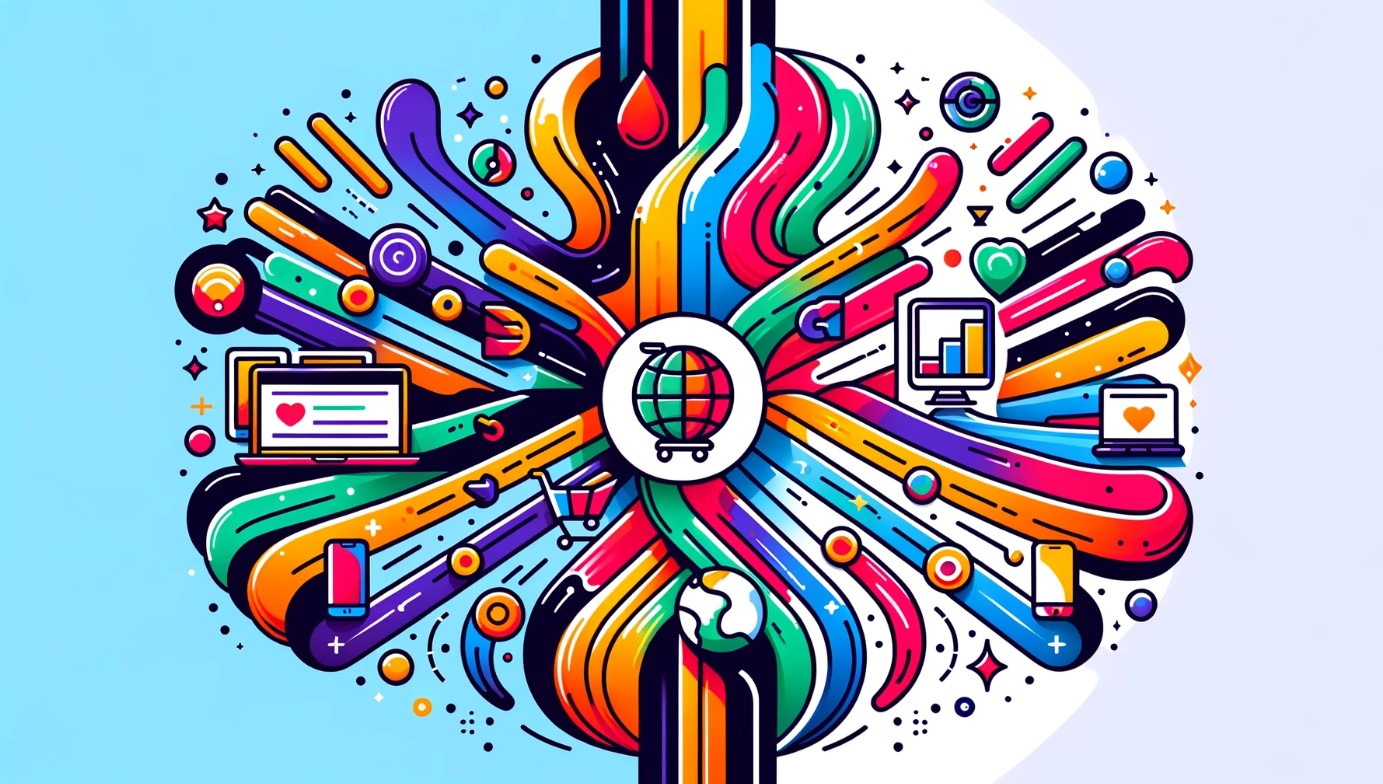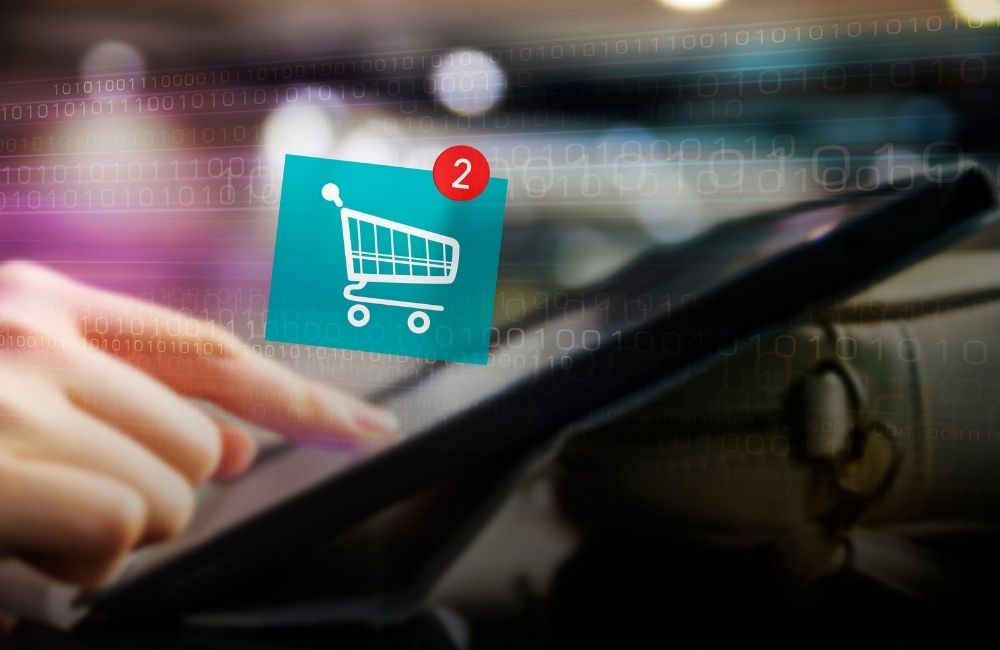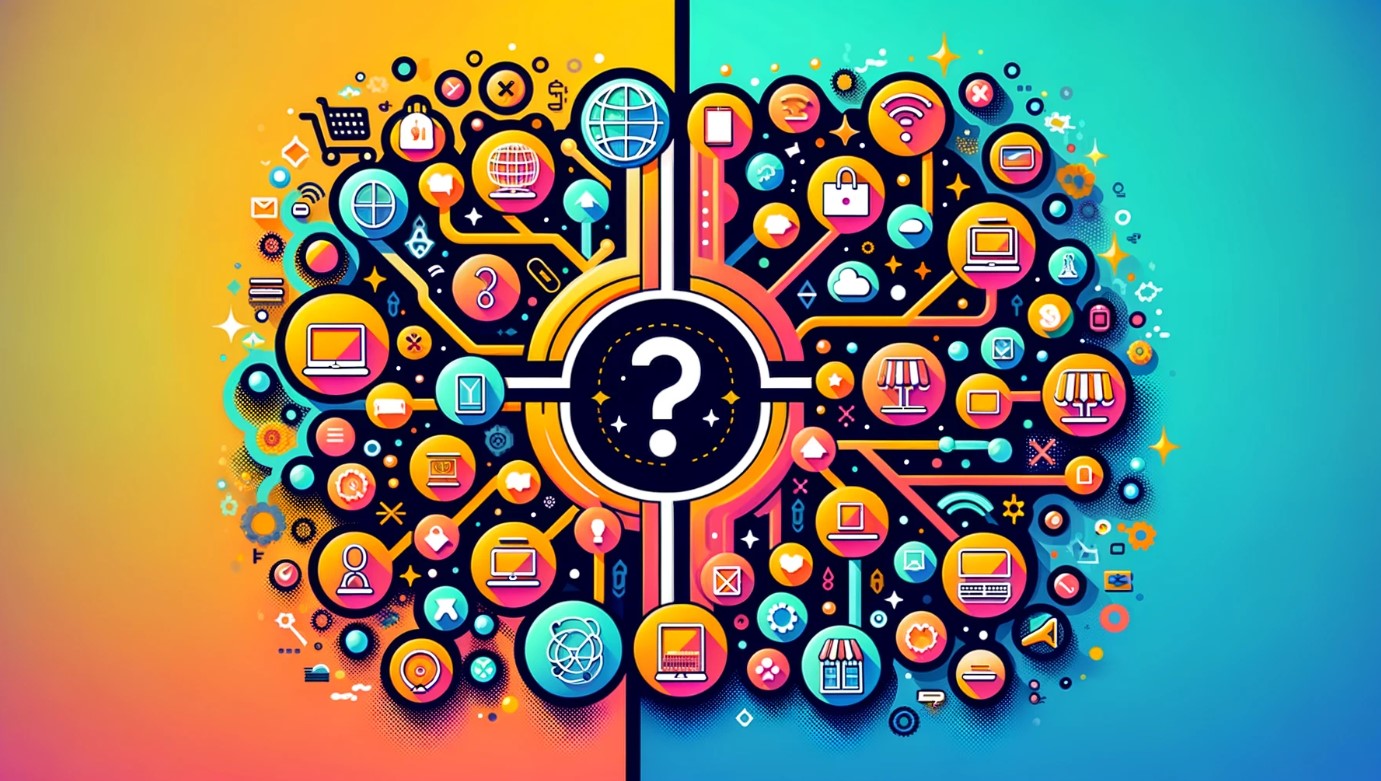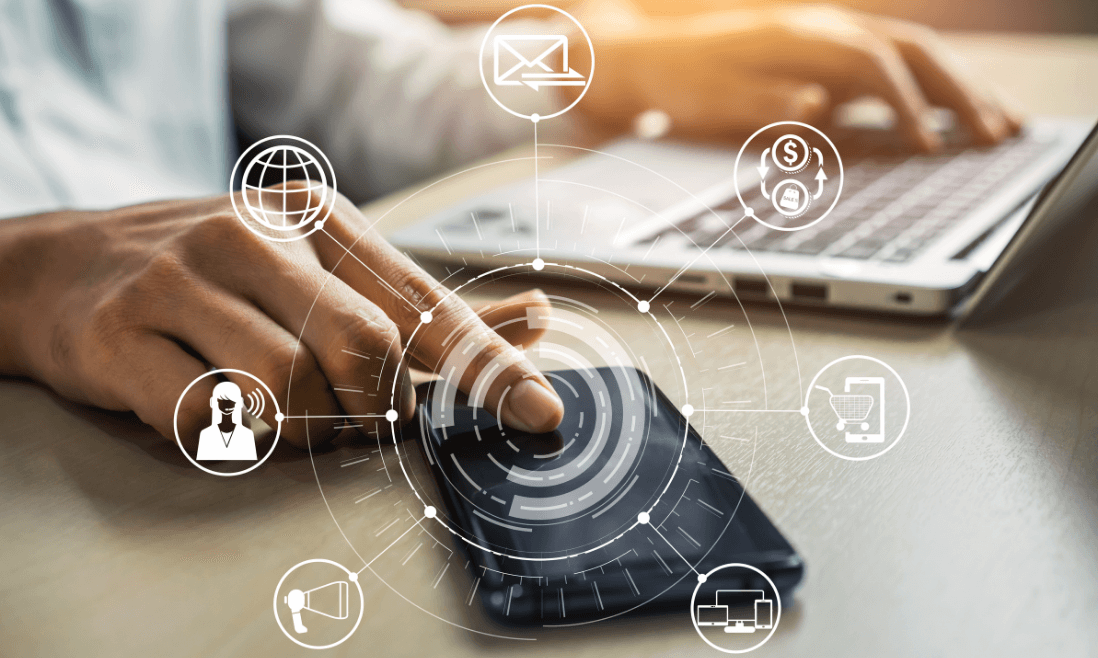Shopping isn’t just about walking into a store and picking up what you need anymore. It’s about experiencing the thrill of finding the perfect item, whether you’re cozy at home browsing on your laptop, scrolling through your phone, or enjoying the buzz of a busy store.
But as businesses, how do we make sure our customers get a smooth and enjoyable experience no matter how they choose to shop with us? That’s where understanding the difference between omnichannel and multichannel strategies comes into play.
In this blog post, we’re diving deep into the world of omnichannel vs. multichannel. These two buzzwords are more than just industry jargon; they’re the key to unlocking a world of possibilities for enhancing customer experience and driving sales.
So, let’s explore together and uncover how to make shopping a seamless adventure for every customer.
Contents
What is Omnichannel?
Omnichannel is a customer-focused business strategy that aims to provide a seamless and consistent shopping experience across all channels a customer might use.
It makes sure no matter where you like to shop—be it in an actual store, on a website, through a mobile app, on social media, online marketplaces like Amazon, or even over the phone with call centers—you get the same great experience. It’s all about making things easy and smooth for the shopper.
Think of it this way: you see a cool pair of sneakers online but you’re not ready to buy them just yet. Later, you’re scrolling through your phone and remember those sneakers, so you add them to your cart.
The next day, you walk into the store, try them on, and buy them right there. Omnichannel is what makes this seamless journey possible.
It connects all the dots, making sure your shopping experience feels like one big, easy process, no matter how you choose to shop.
How Does Omnichannel Work?

Omnichannel might sound complex, but it’s all about making shopping smooth and consistent, no matter how or where a customer chooses to shop. Here’s a closer look at how it functions:
1. Centralized Data
At the heart of the omnichannel strategy is a powerful database that stores everything a business knows about its customers.
This includes what they’ve bought, what they like browsing, their favorite items, how they like to be contacted, and all their past interactions with the brand. Think of it as a super detailed diary that helps businesses understand their customers really well.
2. Integrated Technology
To make the omnichannel magic happen, businesses use a bunch of high-tech tools that talk to each other.
- CRM (Customer Relationship Management) software keeps track of all customer interactions, helping businesses understand what each customer likes and dislikes.
- Inventory Management Systems make sure customers and store workers know if an item is in stock, no matter where they’re looking from.
- Marketing Automation Tools send out personalized messages and deals that make sense for each customer, based on what the business knows about them.
- In-store Technology, like tablets, allow store associates to access all this information and help customers on the spot, making shopping in-store just as informed as shopping online.
3. Channel Coordination
This is where everything comes together.
- Consistent Branding ensures that no matter where a customer interacts with a brand (like in ads, online, or in-store), everything looks and feels the same.
- User-Friendly Interfaces on websites and apps make online shopping as easy as walking into a store.
- Customer Service is ready to help with any issue, aware of the customer’s entire history with the brand, making solutions quick and personal.
To make omnichannel work, businesses focus on understanding and improving the entire journey a customer takes, from seeing a product to buying it. This strategy requires investing in the right technology to collect data, share information between systems, and make every shopping experience feel connected.
What is Multichannel?

Multichannel is a way businesses talk to and reach their customers through many different paths.
Imagine all the ways you might learn about something you want to buy—seeing it on social media, getting an email about it, finding it on a website, walking into a store, or even seeing an ad while browsing online.
Multichannel marketing is when businesses use all these different ways, from physical stores to emails to social media, to tell you about their products.
The big goal here is to make sure the brand is seen everywhere. By using lots of channels, the business has more chances to catch your attention, no matter where you are or what you’re doing.
However, in a multichannel approach, these different paths are like tracks that don’t always cross. This means that what you see or experience in one place, like a store, might be a bit different from what you see online.
Each channel works on its own, trying to get your attention and interest, but they don’t necessarily work together.
How Does Multichannel Work?
Multichannel marketing is about using different ways, or channels, to talk to customers and get them interested in what a business is selling. Here’s how it’s done step by step:
1. Identifying Your Target Audience
First, businesses figure out who they want to talk to. This means understanding the details about people’s likes, dislikes, and where they hang out, both online and offline. Sometimes, businesses divide their audience into smaller groups with similar traits or behaviors to make their messages even more personal.
2. Selecting Channels
Next, they pick the places where their target audience spends time. This could be social media, but the platform depends on the age group they’re targeting—like Instagram for younger folks and Facebook for older ones.
They also consider email for direct talks, blogs or videos for sharing expertise, and even paid ads to reach beyond their usual crowd. Traditional methods like direct mail or print ads can also work if that’s where their audience is.
3. Developing Channel-Specific Content
Each channel is different. A catchy photo might work well on social media, while a detailed guide fits better in a blog post. The key is to change the content to fit each channel’s style while keeping the brand’s look and message consistent. That way, customers recognize the brand wherever they see it.
4. Campaign Planning & Execution
With a plan in hand, businesses decide what to post and when. Using tools, they can schedule posts across different channels, making sure they’re always talking to their customers. Sometimes, they’ll mention one channel on another, like telling email readers to check out their Instagram.
5. Measure and Analyze
After all that work, businesses check to see what’s working. They look at things like how many people liked or commented on social media posts, how many people visited their website, or how many opened their emails.
They put all this info together to see the big picture of how well their campaign did and where they can improve. It’s important to keep an eye on how things are going and be ready to change the plan based on what the numbers say.
What is the Difference Between Multichannel and Omnichannel?

Understanding the differences between multichannel and omnichannel can help businesses decide the best way to reach and serve their customers. Here’s a straightforward breakdown of how they compare:
| Feature | Multichannel | Omnichannel |
|---|---|---|
| Customer Focus | Product-centric | Customer-centric |
| Goal | Maximize reach across separate channels | Provide a seamless, integrated customer experience |
| Channel Integration | Limited, channels may operate independently | High integration, focus on smooth transitions between channels |
| Data | Some data integration, but not always centralized | Robust, unified customer data across all channels |
| Customer Experience | Convenient, but inconsistent across channels | Consistent and personalized experience throughout the journey |
Customer Focus
Multichannel is more about the product. It tries to get the word out across different platforms, but the main goal is to spread the message far and wide, not necessarily to tailor it to each customer.
Omnichannel puts the customer in the center. It’s all about making the shopping experience smooth and personal, no matter how or where the customer chooses to shop.
Goal
Multichannel aims to increase brand presence by being on multiple channels, like social media, emails, or stores. Each channel works on its own to catch the customer’s attention.
Omnichannel‘s goal is to blend these channels seamlessly. It ensures that a customer can jump from one channel to another (like from online browsing to in-store purchasing) without any hassle.
Channel Integration
Multichannel has limited integration. Each channel operates somewhat independently, which can lead to a varied experience for the customer depending on where they interact with the brand.
Omnichannel involves high integration. The transition between channels is smooth, aiming for consistency in customer experience.
Data
Multichannel might use data from different channels, but this data isn’t always shared or centralized. This means one part of the business might not know what the customer did in another part.
Omnichannel relies on robust, unified data across all channels. This comprehensive view allows for personalized experiences and better service, as the entire business understands the customer’s history and preferences.
Customer Experience

Multichannel can be convenient, allowing customers to reach the brand through various channels. However, the experience can be inconsistent. What a customer sees in an email promotion might differ from what’s in the store.
Omnichannel offers a consistent and personalized experience throughout the customer’s journey. Whether online, on an app, or in a physical store, the customer feels seen and understood.
In summary, while multichannel marketing focuses on spreading across various platforms, omnichannel marketing aims to unify these channels around the customer’s experience. Multichannel might get the brand in front of more eyes, but omnichannel ensures a cohesive and satisfying journey for the customer, no matter where they engage with the brand.
Omnichannel vs Multichannel Examples
When thinking about the differences between omnichannel and multichannel strategies, real-life scenarios can help illustrate how they work in practice.
Example 1: New Product Launch
For a new product launch, a multichannel approach might include creating buzz through social media posts, sending out an email blast to all subscribers, setting up eye-catching in-store displays, and updating the website with a new product page. Each channel works independently to spread the word.
In contrast, an omnichannel strategy for launching the same product would ensure that all these efforts are interconnected.
Social media posts would link directly to the product page for easy shopping. Emails sent to customers would not just announce the new product but also include personalized recommendations based on past purchases, possibly highlighting the new item.
If a customer shows interest online, in-store associates could access their online wish list or previous online interactions to suggest the new product, making the recommendation feel personal and well-timed.
Example 2: Seeking Customer Support

When seeking customer support, a multichannel approach might direct a customer to call a specific number, search for answers in an online FAQ section, or reach out via social media like Twitter for a quick question. However, these channels often operate in silos, meaning the customer may need to repeat their issue if they switch between channels.
On the other hand, an omnichannel support experience is designed to be smooth and integrated. A customer could start a live chat on the website, and the support agent would have immediate access to the customer’s order history and past interactions, allowing for a quick resolution within the chat.
The knowledge base could offer personalized answers based on the customer’s account and previous queries. If the customer then tweets about an issue, customer service reps can continue the conversation through direct messages with full context, ensuring a cohesive and efficient support experience.
Example 3: Holiday Shopping
During the holiday shopping season, a multichannel strategy might involve launching a holiday gift guide on the website, decorating physical stores with festive displays, sending out emails to promote holiday sales, and sharing gift ideas through social media. While these efforts aim to cover all bases, they might not be connected, potentially offering a fragmented experience to the shopper.
Conversely, an omnichannel approach ensures that the holiday shopping experience is unified and convenient. The online gift guide would allow shoppers to immediately buy or reserve items in-store. Promotions seen in-store would be echoed on social media, emails, and the website, providing a consistent message across all touchpoints.
If a shopper buys a gift online, they could easily exchange or return it at any physical location. Customer service could also offer tailored gift suggestions based on the shopper’s complete purchase history, both online and in-store, making the gift-buying process personal and stress-free.
How to Choose Between Omnichannel vs Multichannel

Choosing between an omnichannel and multichannel strategy can feel like a big decision for your business. Here’s a simple guide to help you figure out which approach might suit you best.
Step 1: Understanding Your Customers’ Expectations
First, think about your customers and what they expect from you. If your customers are looking for a super smooth experience where they can switch between shopping online, on their phones, and in your store without any hiccups, an omnichannel approach might be what they’re after.
On the other hand, if your customers are more traditional and don’t mind a bit of a disconnect between different shopping methods, a multichannel approach could work well.
Step 2: Aligning with Business Goals
Next, consider what you’re aiming to achieve with your business. If getting your brand out there across as many channels as possible is your main goal, multichannel could be the way to go. It lets you spread your message far and wide.
However, if you’re all about building strong customer loyalty and giving your customers a top-notch brand experience that encourages them to keep coming back, then omnichannel might be your best bet.
Step 3: Budget and Resource Considerations
Your budget and resources are also crucial factors. Setting up an omnichannel strategy takes a bit more investment.
You’ll need the right technology to make sure all your channels are talking to each other, and you might need to spend some time training your staff to handle this new, integrated approach. If your budget is tight or you’re just starting out, you might want to start with a multichannel approach and work your way up.
Step 4: Assessing Your Product or Service Complexity
Think about what you’re selling, too. If your product or service is pretty straightforward, you might not need the complexity of an omnichannel strategy.
But if what you’re offering is a bit more complex, providing that seamless omnichannel support could really help your customers understand and appreciate your product or service.
Take a look at what your competitors and the rest of your industry are doing as well. If everyone else is moving towards an omnichannel approach, it might be something you need to consider to keep up.
Step 5: Choose Your Strategy
If you’re leaning towards valuing a seamless customer experience, have the budget for technology upgrades, and are facing competition that’s already embracing omnichannel, then it might be time to consider making the leap.
On the flip side, if you’re just starting to expand your online presence or you’re working with limited resources, beginning with a multichannel strategy could make more sense.
It’s less about choosing one and sticking with it forever and more about what makes sense for your business right now. Remember, it’s perfectly okay to start with multichannel and grow into an omnichannel approach as your business and customer needs evolve.

